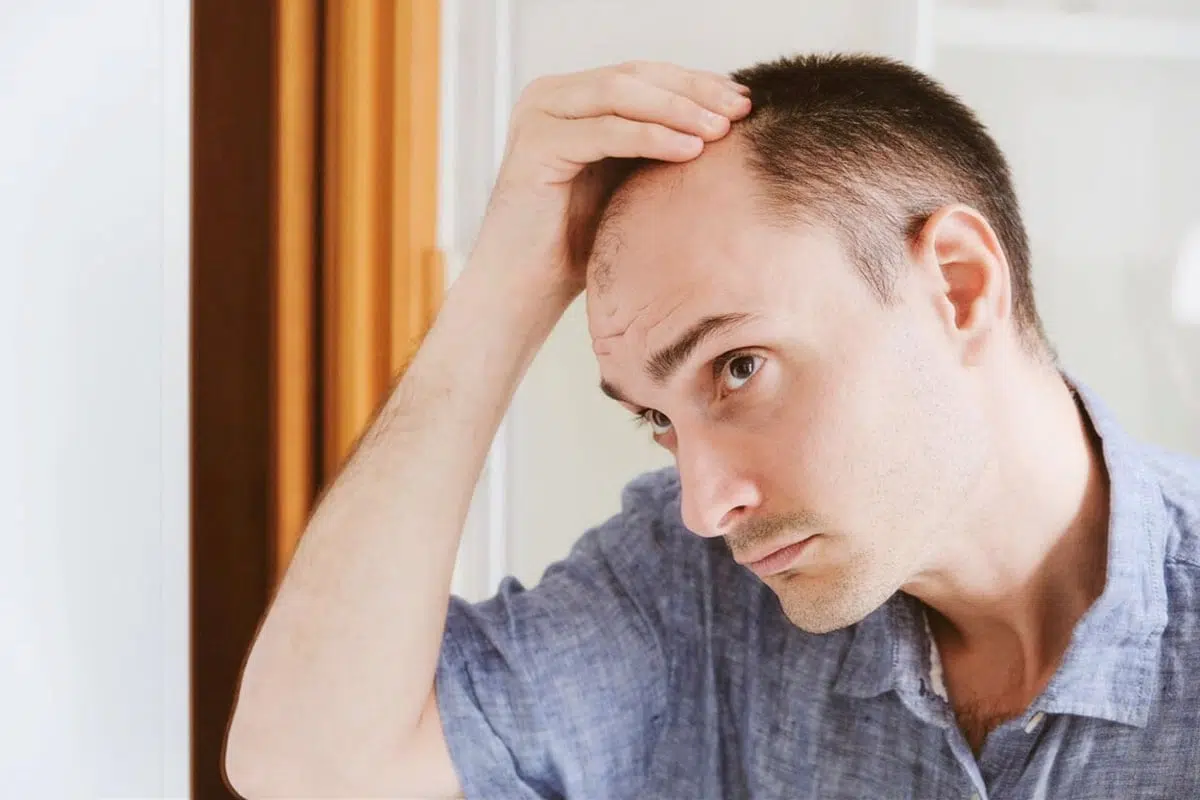Have you noticed that your hair is thinning lately? “I can’t be getting to that age already”, you might say.
Believe it or not, hair loss, also known as alopecia, is common in men of all ages. But no matter how old you are, it can still greatly affect your self-esteem.
In this blog post, break down what the average age of male hair loss is and what you can do about it.
What Causes Hair Loss?
The age you start losing hair could depend on the type of hair loss you experience. Many factors can affect hair loss. Types of hair loss include:
- Genetics/Androgenetic Alopecia: Also known as male pattern baldness, this is when high levels of the hormone dihydrotestosterone (DHT) affects susceptible hair follicles. Male pattern baldness accounts for 95% of hair loss in men, according to the American Hair Loss Association.
- Traction Alopecia: This type of hair loss is caused by wearing tight hairstyles for too long. Scarring on the scalp can lead to permanent hair loss
- Alopecia Areata: An autoimmune condition that causes sudden bald patches.
- Telogen Effluvium: A temporary condition often triggered by stress, hormonal changes, or illness, leading to hair thinning.
- Trichotillomania: A type of obsessive-compulsive disorder that causes people to pull their own hair out. Over time, this can damage the hair follicles and lead to permanent hair loss.
- Nutritional Deficiencies: Your diet can affect hair loss. Vitamin deficiencies, particularly Vitamin D, can be linked to thinning hair.
- Certain Medications: Medications used for cancer, arthritis, heart problems, depression, and other diseases.
- Radiation Therapy: Once the hair starts to grow back, it may not grow the same as it did before.
- Stress: Chronic stress or a sudden stressful event that causes physical or emotional shock
- Hormones: Hormonal imbalances, particularly in women, can affect hair growth and loss.
- Weight Loss: Significant weight loss, either intentional or unintentional can trigger hair loss.
What Is The Average Age of Balding?
Hair loss is different for everyone, so there isn’t a “normal” age to lose hair. Thinning hair caused by male pattern baldness tends to be more common the older you get. However, men of all ages can experience hair loss, and can start as early as their 20s.
- 25% of men start losing hair before age 21
- 66% of men start losing hair by age 35
- 85% of men start losing hair by age 50
The vast majority of men will experience hair loss at some point in their lives. Some only experience a small amount of balding, while others will have more. It depends on your genetics, environmental factors, and your age when the hair loss started.
Source: American Hair Loss Association
Hair loss can happen to anyone, even without a family history of male pattern baldness. Other causes of hair loss can occur at any age.
How Fast Does Hair Loss Progress?
For men, it typically takes 15-25 years to go completely bald after noticing the initial signs of hair loss. However, for some, it can take as little as five years. It just depends on your genetics and what is causing your hair loss.
Norwood Men’s Hair Loss Scale
Did you know that you can classify your level of hair loss? Hair loss experts use the Hamilton Norwood Scale (aka the Norwood Men’s Hair Loss Scale) to identify the progression of hair loss. This method applies to male pattern baldness and can help you understand what is happening to your hair.
For male pattern baldness, all men fall into one of 7 stages on the Norwood Men’s Hair Loss Scale.
- Norwood Stage 1: Little to no signs of hair loss
- Norwood Stage 2: Hair loss starts to become noticeable with a receding hairline
- Norwood Stage 3: Starting to lose hair on the crown of your head, deepening wedge-shaped pattern in temporal areas
- Norwood Stage 4: Temporal areas have thinned out, hair loss in the crown starts to form a bald spot, and a thick bridge divides the temporal areas
- Norwood Stage 5: More noticeable hair loss in frontal and temporal areas, hair density is reduced, front corners and crown narrowed
- Norwood Stage 6: Peach fuzz appearance on the crown, forefront join with the balding area at the crown
- Norwood Stage 7: The only hair left is on the back and sides, forming a horseshoe pattern with decreasing density
Can You Prevent Hair Loss?
If your hair loss is genetic, there isn’t much you can do about that. However, you can take preventative steps as you age to minimize loss and keep the hair you do have healthy.
- Eat a healthy, nutritious diet. Make sure you aren’t deficient in any vitamins and that you are eating enough. Eating very few calories can cause hair loss.
- Get regular exercise, and try to live a generally healthy life.
- Use a gentle shampoo and a moisturizing conditioner. Additionally, using a leave-in conditioner after you shower can help to prevent breakage.
- Quit smoking if you do.
- Find healthy ways to cope with stress.
- Avoid harsh treatments such as bleaching and chemical relaxers. If you really want one of these treatments, go to a salon and let the professionals do it. Don’t do it yourself at home.
- Avoid wearing tight hairstyles that pull on the hair.
- See your doctor if you believe you have an underlying condition that is causing your hair loss.
- Avoid applying heat to the hair, such as hair dryers or straighteners.
- Try doing regular scalp massages. They may stimulate hair growth.
What To Do If You Start Losing Hair
Even if you take preventative measures, sometimes hair loss is inevitable. That doesn’t mean you have to accept your hair loss at a young age, though. You still have options.
See Your Doctor
Speak to your doctor or dermatologist as your first port-of-call. 9 out of 10 times, your hair loss is probably simply due to genetics. However, your doctor can determine if something else is going on. Understanding the type and degree of hair loss is crucial for choosing the right treatment.
They can also advise you on nutrition, and switch up your medications if needed. Medications like Minoxidil and Finasteride are used to treat hair loss, however you will lose the hair again once you stop taking the medication.
Your dermatologist can give you specific advice and offer treatments that slow hair loss.
Consult A Hair Restoration Specialist
Once you have permanent hair loss, there is only one real way to get it back – hair transplant surgery. Essentially, a hair surgeon will take hair from the back and sides of the scalp and implant the follicles into balding areas of the head. These implanted hair follicles are permanent.
Conclusion: Age and Hair Loss
No matter what type of hair loss or the age you experience hair loss, you don’t have to accept going bald. When seeking hair loss treatment, the earlier, the better.
If you are dealing with hair loss, we encourage you to reach out to the hair loss experts at Natural Transplants. Our staff works with men and women of all ages. Our patients travel from around the world to visit our hair loss clinics in South Florida and Washington, DC.

